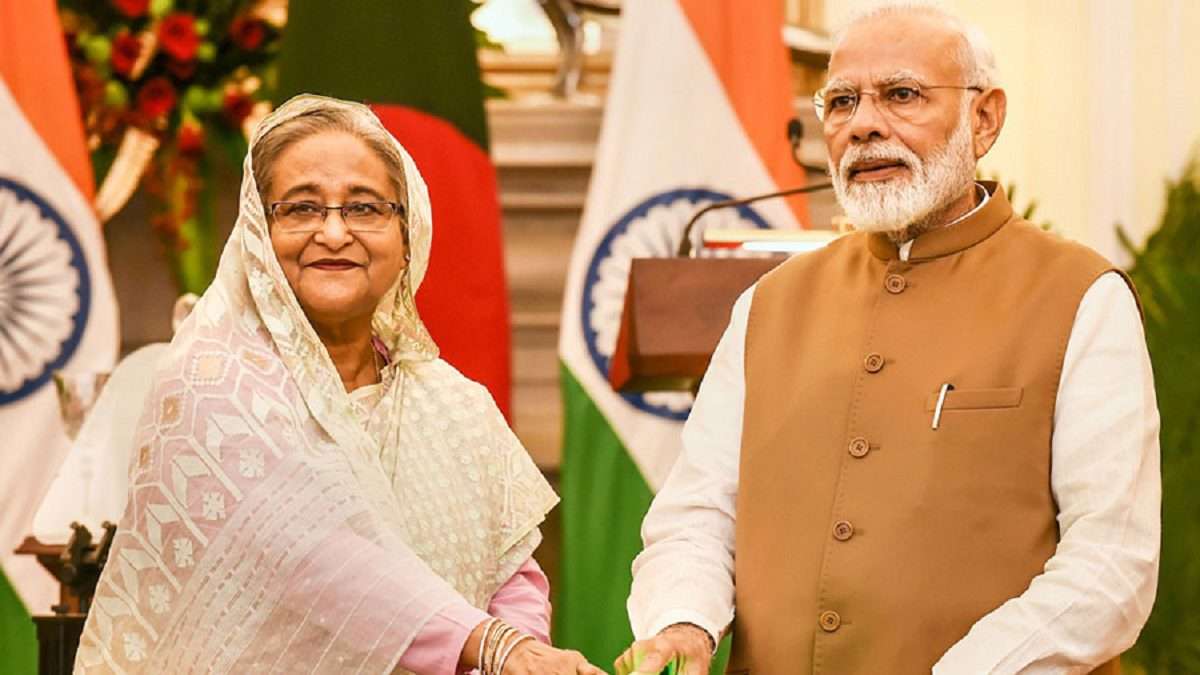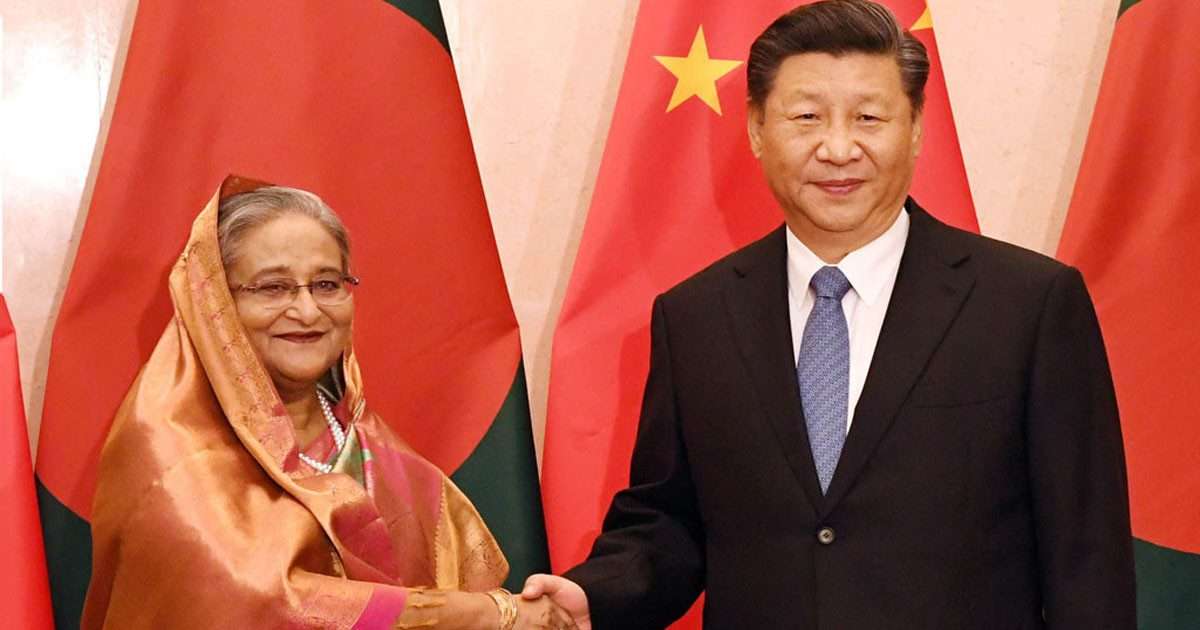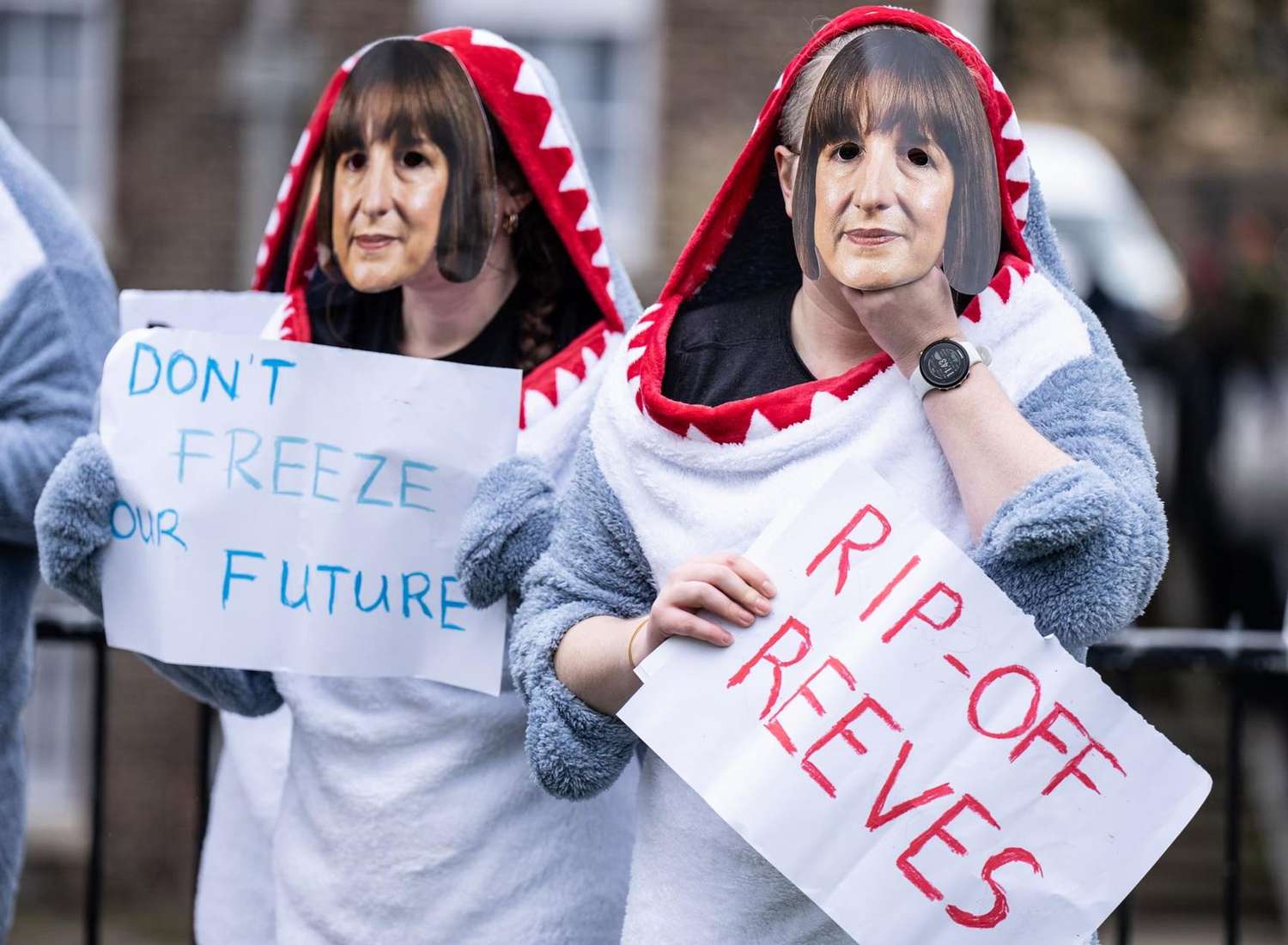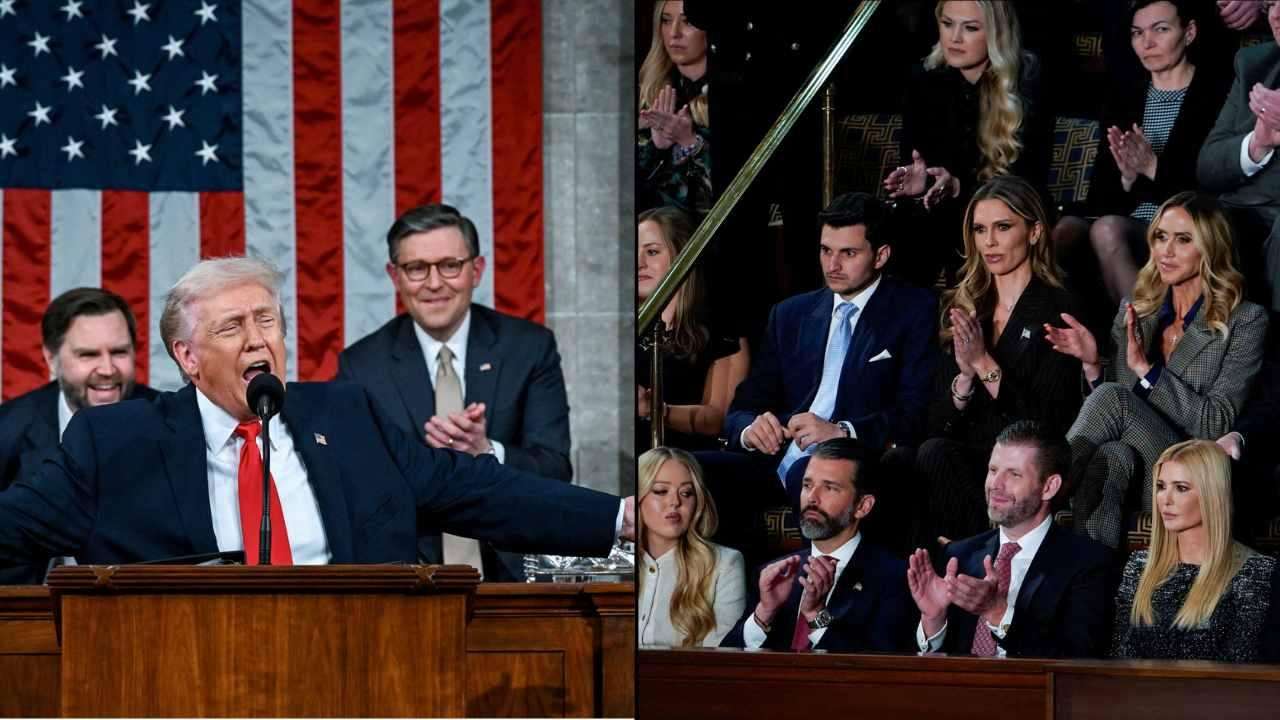
The United States added to its recent campaign against Dhaka on behalf of human rights on May 24 when it declared it will refuse visas to Bangladeshis who are thought to have participated in election cheating.
Bangladesh has been charged by the United States with political violence, abuses of human rights, and electoral meddling. Some experts claim that given the geopolitical rivalry between the United States and China, Hasina is being pressured by this attitude to lessen Beijing's influence in Dhaka.
Given Delhi's long-standing strategic connection with the Awami League, Washington's actions against Hasina have unintentionally put India in a difficult position.
India will therefore need to make compromises between the US, its alliance partner in the Quad, and China, a contender in the region, who both oppose Hasina.
Washington’ stance
If it is considered that they are undermining free and fair elections, the United States' new visa policy for Bangladesh targets current and former Bangladeshi officials, members of pro-government and Opposition parties, and members of law enforcement, the judiciary, and security services. Visas may also be denied to their relatives.
While the Bangladeshi government insists there is no cause for concern, analysts fear it will harm officials who wish to send their kids to study in the United States, a practice that is prevalent among South Asian elites.
Washington has recently taken a number of similar measures to put pressure on Hasina's government about human rights and to caution it against manipulating election results.
Washington sanctioned the Rapid Action Battalion and a number of its former and present officials in December 2021. According to allegations, the government of Bangladesh used the Rapid Action Battalion, an elite paramilitary squad, to commit extrajudicial killings and enforced disappearances.
The American ambassador to Bangladesh, Peter Haas, met with the relatives of those who had allegedly been coerced to disappear during Hasina's leadership a year later, shocking everyone.
Derek Chollet, a counselor with the State Department of the United States, cautioned Dhaka in February that democratic regress would limit American collaboration and nudge Hasina to assure free and fair elections.
Hasina has responded to American moves by claiming that Washington is attempting to overthrow her government.
Avinash Paliwal, an associate professor of international affairs at SOAS University of London, and other observers contend that China's growing investment in Bangladesh is the "most dominant factor" influencing the conflict between Washington and Dhaka. According to Paliwal, "The US is cautious about the approach it's taking [with regard to China]."
Through the Belt and Road Initiative, Beijing's worldwide infrastructure development goal, China has made major investments in Bangladesh. 90% of Bangladesh's new energy projects are also financed by China.
Washington does not trust Hasina on China, according to a veteran journalist working in Dhaka who did not want to be named.
He asserted that "[Washington's measures] are a component of its China containment policy."
However, according to Michael Kugelman, director of the South Asia Institute at the Wilson Center in the US, Washington's strategy is more focused on using Bangladesh as an illustration of its values-based foreign policy, which prioritizes the promotion of democracy. Kugelman told Scroll, "This doesn't mean [Washington] has generally adopted a combative attitude against Dhaka. "Though this is a selective approach, Bangladesh is vigorously implementing it. Consequently, the anti-democratic practices of the Awami League are now under attack by the [Biden] administration.
The Biden administration has a "strong policy and narrative about democracy over authoritarianism," according to British journalist and Bangladesh expert David Bergman. "I don't believe that Chinese influence in Bangladesh is the cause," Bergman told Scroll.
Tricky situation for India?
However, India finds itself in a precarious position as a result of Washington's strategy. Even though the US and India are allies in other areas, their objectives in Bangladesh appear to be at odds because Delhi backs Hasina.
According to Scroll, Harsh V Pant is the vice president for studies at the Observer Research Foundation. India and Sheikh Hasina have undoubtedly established close connections, according to Pant. "The relations have made significant progress during her leadership, and their connection is stable. This stability is encouraging for Bangladesh, India, and the rest of the region.
There have previously been tense times between India and Bangladesh, particularly when the Bangladesh Nationalist Party was in power in Dhaka. Many people believe the Bangladesh Nationalist Party to be anti-Indian. But with Hasina at the helm in Dhaka, India-Bangladesh bilateral ties stabilised and deepened significantly over the past 15 years.
This has made it possible for both nations to resolve their differences, including the long-running land border issue, increase commerce, and collaborate on regional connectivity—all of which are essential for Delhi. Additionally, the Hasina administration has cracked down on rebels from North East India operating out of Bangladesh.
According to Pant, Delhi will not want to provoke Hasina's administration the way Washington can. He remarked, referring to the Bangladesh Nationalist Party, "India will continue to support Hasina in any way possible because India's appreciation of the alternative is also perhaps much more nuanced than Washington's." India wouldn't likely want to take involved in the Dhaka-Washington kerfuffle, in my opinion.
Similar to this, Paliwal claimed that while certain BNP leadership members are aware of the need for strong ties with India, Delhi does not think the party can accomplish as much as Hasina has over the years. But if the party wins, India will have to deal with the BNP, he added.
The aforementioned veteran journalist who wished to remain anonymous agreed. He claimed that "India views the BNP as extremist."
‘Best bet is to stay quiet’
Therefore, Kugelman claimed, India is powerless to influence Washington's treatment of Hasina. Delhi would undoubtedly prefer that the AL take back the reins of power, according to Kugelman. But being silent is its best option. Although Hasina and the AL may be friendly with Modi and the BJP, Bangladesh's general opinion of India is more nuanced.
"[Delhi's silence] earns it even more trust and goodwill from Dhaka, but puts its position at odds with Washington," the speaker continued.
[caption id="attachment_66" align="alignnone" width="1200"]

Chinese President Xi Jinping meeting Bangladesh Prime Minister Hasina.[/caption]
China playing all sides?
The seasoned writer asserted that Beijing also favors Hasina's continued rule. "[China] has made a lot of investments in Bangladesh," he declared. "The BNP has criticized Chinese positions and is now more pro-American."
In other words, adversaries China and India concur in this instance. The seasoned journalist claimed that Bangladesh was the only country where China and India's interests (Hasina staying in power) coincided.
Bergman added that given that Beijing has worked with Hasina for more than ten years, it's possible that China prefers her.
Beijing, according to Kugelman, will back anyone ready to cooperate with it. "China is comfortable with Hasina because China's footprint in Bangladesh has deepened significantly over her time in power," he said. However, I'm certain that the BNP would welcome Chinese participation if it were to win the election, and Beijing would cooperate with a BNP PM as well.
China is playing all sides, according to Paliwal and Pant. Paliwal said that "it is wooing Hasina and pushing her against the US." However, it is also speaking with the BNP.
Source: Nachiket Deuskar(scroll.in)
 The United States added to its recent campaign against Dhaka on behalf of human rights on May 24 when it declared it will refuse visas to Bangladeshis who are thought to have participated in election cheating.
Bangladesh has been charged by the United States with political violence, abuses of human rights, and electoral meddling. Some experts claim that given the geopolitical rivalry between the United States and China, Hasina is being pressured by this attitude to lessen Beijing's influence in Dhaka.
Given Delhi's long-standing strategic connection with the Awami League, Washington's actions against Hasina have unintentionally put India in a difficult position.
India will therefore need to make compromises between the US, its alliance partner in the Quad, and China, a contender in the region, who both oppose Hasina.
Washington’ stance
If it is considered that they are undermining free and fair elections, the United States' new visa policy for Bangladesh targets current and former Bangladeshi officials, members of pro-government and Opposition parties, and members of law enforcement, the judiciary, and security services. Visas may also be denied to their relatives.
While the Bangladeshi government insists there is no cause for concern, analysts fear it will harm officials who wish to send their kids to study in the United States, a practice that is prevalent among South Asian elites.
Washington has recently taken a number of similar measures to put pressure on Hasina's government about human rights and to caution it against manipulating election results.
Washington sanctioned the Rapid Action Battalion and a number of its former and present officials in December 2021. According to allegations, the government of Bangladesh used the Rapid Action Battalion, an elite paramilitary squad, to commit extrajudicial killings and enforced disappearances.
The American ambassador to Bangladesh, Peter Haas, met with the relatives of those who had allegedly been coerced to disappear during Hasina's leadership a year later, shocking everyone.
Derek Chollet, a counselor with the State Department of the United States, cautioned Dhaka in February that democratic regress would limit American collaboration and nudge Hasina to assure free and fair elections.
Hasina has responded to American moves by claiming that Washington is attempting to overthrow her government.
Avinash Paliwal, an associate professor of international affairs at SOAS University of London, and other observers contend that China's growing investment in Bangladesh is the "most dominant factor" influencing the conflict between Washington and Dhaka. According to Paliwal, "The US is cautious about the approach it's taking [with regard to China]."
Through the Belt and Road Initiative, Beijing's worldwide infrastructure development goal, China has made major investments in Bangladesh. 90% of Bangladesh's new energy projects are also financed by China.
Washington does not trust Hasina on China, according to a veteran journalist working in Dhaka who did not want to be named.
He asserted that "[Washington's measures] are a component of its China containment policy."
However, according to Michael Kugelman, director of the South Asia Institute at the Wilson Center in the US, Washington's strategy is more focused on using Bangladesh as an illustration of its values-based foreign policy, which prioritizes the promotion of democracy. Kugelman told Scroll, "This doesn't mean [Washington] has generally adopted a combative attitude against Dhaka. "Though this is a selective approach, Bangladesh is vigorously implementing it. Consequently, the anti-democratic practices of the Awami League are now under attack by the [Biden] administration.
The Biden administration has a "strong policy and narrative about democracy over authoritarianism," according to British journalist and Bangladesh expert David Bergman. "I don't believe that Chinese influence in Bangladesh is the cause," Bergman told Scroll.
Tricky situation for India?
However, India finds itself in a precarious position as a result of Washington's strategy. Even though the US and India are allies in other areas, their objectives in Bangladesh appear to be at odds because Delhi backs Hasina.
According to Scroll, Harsh V Pant is the vice president for studies at the Observer Research Foundation. India and Sheikh Hasina have undoubtedly established close connections, according to Pant. "The relations have made significant progress during her leadership, and their connection is stable. This stability is encouraging for Bangladesh, India, and the rest of the region.
There have previously been tense times between India and Bangladesh, particularly when the Bangladesh Nationalist Party was in power in Dhaka. Many people believe the Bangladesh Nationalist Party to be anti-Indian. But with Hasina at the helm in Dhaka, India-Bangladesh bilateral ties stabilised and deepened significantly over the past 15 years.
This has made it possible for both nations to resolve their differences, including the long-running land border issue, increase commerce, and collaborate on regional connectivity—all of which are essential for Delhi. Additionally, the Hasina administration has cracked down on rebels from North East India operating out of Bangladesh.
According to Pant, Delhi will not want to provoke Hasina's administration the way Washington can. He remarked, referring to the Bangladesh Nationalist Party, "India will continue to support Hasina in any way possible because India's appreciation of the alternative is also perhaps much more nuanced than Washington's." India wouldn't likely want to take involved in the Dhaka-Washington kerfuffle, in my opinion.
Similar to this, Paliwal claimed that while certain BNP leadership members are aware of the need for strong ties with India, Delhi does not think the party can accomplish as much as Hasina has over the years. But if the party wins, India will have to deal with the BNP, he added.
The aforementioned veteran journalist who wished to remain anonymous agreed. He claimed that "India views the BNP as extremist."
‘Best bet is to stay quiet’
Therefore, Kugelman claimed, India is powerless to influence Washington's treatment of Hasina. Delhi would undoubtedly prefer that the AL take back the reins of power, according to Kugelman. But being silent is its best option. Although Hasina and the AL may be friendly with Modi and the BJP, Bangladesh's general opinion of India is more nuanced.
"[Delhi's silence] earns it even more trust and goodwill from Dhaka, but puts its position at odds with Washington," the speaker continued.
[caption id="attachment_66" align="alignnone" width="1200"]
The United States added to its recent campaign against Dhaka on behalf of human rights on May 24 when it declared it will refuse visas to Bangladeshis who are thought to have participated in election cheating.
Bangladesh has been charged by the United States with political violence, abuses of human rights, and electoral meddling. Some experts claim that given the geopolitical rivalry between the United States and China, Hasina is being pressured by this attitude to lessen Beijing's influence in Dhaka.
Given Delhi's long-standing strategic connection with the Awami League, Washington's actions against Hasina have unintentionally put India in a difficult position.
India will therefore need to make compromises between the US, its alliance partner in the Quad, and China, a contender in the region, who both oppose Hasina.
Washington’ stance
If it is considered that they are undermining free and fair elections, the United States' new visa policy for Bangladesh targets current and former Bangladeshi officials, members of pro-government and Opposition parties, and members of law enforcement, the judiciary, and security services. Visas may also be denied to their relatives.
While the Bangladeshi government insists there is no cause for concern, analysts fear it will harm officials who wish to send their kids to study in the United States, a practice that is prevalent among South Asian elites.
Washington has recently taken a number of similar measures to put pressure on Hasina's government about human rights and to caution it against manipulating election results.
Washington sanctioned the Rapid Action Battalion and a number of its former and present officials in December 2021. According to allegations, the government of Bangladesh used the Rapid Action Battalion, an elite paramilitary squad, to commit extrajudicial killings and enforced disappearances.
The American ambassador to Bangladesh, Peter Haas, met with the relatives of those who had allegedly been coerced to disappear during Hasina's leadership a year later, shocking everyone.
Derek Chollet, a counselor with the State Department of the United States, cautioned Dhaka in February that democratic regress would limit American collaboration and nudge Hasina to assure free and fair elections.
Hasina has responded to American moves by claiming that Washington is attempting to overthrow her government.
Avinash Paliwal, an associate professor of international affairs at SOAS University of London, and other observers contend that China's growing investment in Bangladesh is the "most dominant factor" influencing the conflict between Washington and Dhaka. According to Paliwal, "The US is cautious about the approach it's taking [with regard to China]."
Through the Belt and Road Initiative, Beijing's worldwide infrastructure development goal, China has made major investments in Bangladesh. 90% of Bangladesh's new energy projects are also financed by China.
Washington does not trust Hasina on China, according to a veteran journalist working in Dhaka who did not want to be named.
He asserted that "[Washington's measures] are a component of its China containment policy."
However, according to Michael Kugelman, director of the South Asia Institute at the Wilson Center in the US, Washington's strategy is more focused on using Bangladesh as an illustration of its values-based foreign policy, which prioritizes the promotion of democracy. Kugelman told Scroll, "This doesn't mean [Washington] has generally adopted a combative attitude against Dhaka. "Though this is a selective approach, Bangladesh is vigorously implementing it. Consequently, the anti-democratic practices of the Awami League are now under attack by the [Biden] administration.
The Biden administration has a "strong policy and narrative about democracy over authoritarianism," according to British journalist and Bangladesh expert David Bergman. "I don't believe that Chinese influence in Bangladesh is the cause," Bergman told Scroll.
Tricky situation for India?
However, India finds itself in a precarious position as a result of Washington's strategy. Even though the US and India are allies in other areas, their objectives in Bangladesh appear to be at odds because Delhi backs Hasina.
According to Scroll, Harsh V Pant is the vice president for studies at the Observer Research Foundation. India and Sheikh Hasina have undoubtedly established close connections, according to Pant. "The relations have made significant progress during her leadership, and their connection is stable. This stability is encouraging for Bangladesh, India, and the rest of the region.
There have previously been tense times between India and Bangladesh, particularly when the Bangladesh Nationalist Party was in power in Dhaka. Many people believe the Bangladesh Nationalist Party to be anti-Indian. But with Hasina at the helm in Dhaka, India-Bangladesh bilateral ties stabilised and deepened significantly over the past 15 years.
This has made it possible for both nations to resolve their differences, including the long-running land border issue, increase commerce, and collaborate on regional connectivity—all of which are essential for Delhi. Additionally, the Hasina administration has cracked down on rebels from North East India operating out of Bangladesh.
According to Pant, Delhi will not want to provoke Hasina's administration the way Washington can. He remarked, referring to the Bangladesh Nationalist Party, "India will continue to support Hasina in any way possible because India's appreciation of the alternative is also perhaps much more nuanced than Washington's." India wouldn't likely want to take involved in the Dhaka-Washington kerfuffle, in my opinion.
Similar to this, Paliwal claimed that while certain BNP leadership members are aware of the need for strong ties with India, Delhi does not think the party can accomplish as much as Hasina has over the years. But if the party wins, India will have to deal with the BNP, he added.
The aforementioned veteran journalist who wished to remain anonymous agreed. He claimed that "India views the BNP as extremist."
‘Best bet is to stay quiet’
Therefore, Kugelman claimed, India is powerless to influence Washington's treatment of Hasina. Delhi would undoubtedly prefer that the AL take back the reins of power, according to Kugelman. But being silent is its best option. Although Hasina and the AL may be friendly with Modi and the BJP, Bangladesh's general opinion of India is more nuanced.
"[Delhi's silence] earns it even more trust and goodwill from Dhaka, but puts its position at odds with Washington," the speaker continued.
[caption id="attachment_66" align="alignnone" width="1200"] Chinese President Xi Jinping meeting Bangladesh Prime Minister Hasina.[/caption]
China playing all sides?
The seasoned writer asserted that Beijing also favors Hasina's continued rule. "[China] has made a lot of investments in Bangladesh," he declared. "The BNP has criticized Chinese positions and is now more pro-American."
In other words, adversaries China and India concur in this instance. The seasoned journalist claimed that Bangladesh was the only country where China and India's interests (Hasina staying in power) coincided.
Bergman added that given that Beijing has worked with Hasina for more than ten years, it's possible that China prefers her.
Beijing, according to Kugelman, will back anyone ready to cooperate with it. "China is comfortable with Hasina because China's footprint in Bangladesh has deepened significantly over her time in power," he said. However, I'm certain that the BNP would welcome Chinese participation if it were to win the election, and Beijing would cooperate with a BNP PM as well.
China is playing all sides, according to Paliwal and Pant. Paliwal said that "it is wooing Hasina and pushing her against the US." However, it is also speaking with the BNP.
Source: Nachiket Deuskar(scroll.in)
Chinese President Xi Jinping meeting Bangladesh Prime Minister Hasina.[/caption]
China playing all sides?
The seasoned writer asserted that Beijing also favors Hasina's continued rule. "[China] has made a lot of investments in Bangladesh," he declared. "The BNP has criticized Chinese positions and is now more pro-American."
In other words, adversaries China and India concur in this instance. The seasoned journalist claimed that Bangladesh was the only country where China and India's interests (Hasina staying in power) coincided.
Bergman added that given that Beijing has worked with Hasina for more than ten years, it's possible that China prefers her.
Beijing, according to Kugelman, will back anyone ready to cooperate with it. "China is comfortable with Hasina because China's footprint in Bangladesh has deepened significantly over her time in power," he said. However, I'm certain that the BNP would welcome Chinese participation if it were to win the election, and Beijing would cooperate with a BNP PM as well.
China is playing all sides, according to Paliwal and Pant. Paliwal said that "it is wooing Hasina and pushing her against the US." However, it is also speaking with the BNP.
Source: Nachiket Deuskar(scroll.in)







.svg)
